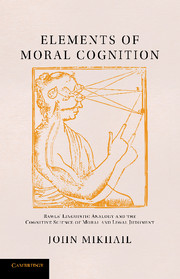 Elements of Moral Cognition
Elements of Moral Cognition 10 - Toward a Universal Moral Grammar
Published online by Cambridge University Press: 07 September 2011
Summary
The moral sense is a distinct and original power of the human mind. … Our knowledge of moral philosophy, of natural jurisprudence, of the law of nations, must ultimately depend, for its first principles, on the evidence and information of the moral sense.
– James Wilson, Lectures on LawHobbes … [believes] that justice is founded on contract solely, and does not result from the construction of man. I believe, on the contrary, that it is instinct, and innate, that the moral sense is as much a part of our constitution as that of feeling, seeing, or hearing. … The moral sense, or conscience, is as much a part of man as his leg or arm.
– Thomas Jefferson, Letter to Peter CarrBeing men, they all have what Dr. Rush calls a moral faculty; Dr. Hutcheson a moral sense; and the Bible and the generality of the world, a conscience.
– John Adams, Letter to John TaylorAll human beings are born free and equal in dignity and rights. They are endowed with reason and conscience and should act towards one another in a spirit of brotherhood.
– Article 1, Universal Declaration of Human RightsThe main arguments of this book have been relatively simple and straightforward. In Chapter 1, I began by asking whether the theory of moral cognition is usefully modeled on aspects of Chomsky's theory of Universal Grammar.
- Type
- Chapter
- Information
- Elements of Moral CognitionRawls' Linguistic Analogy and the Cognitive Science of Moral and Legal Judgment, pp. 307 - 318Publisher: Cambridge University PressPrint publication year: 2011
- 1
- Cited by


